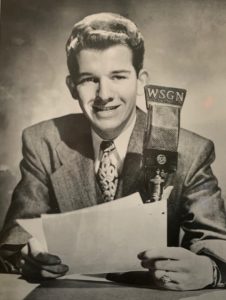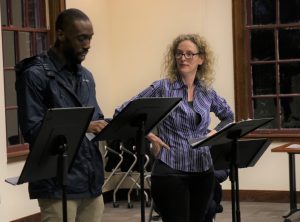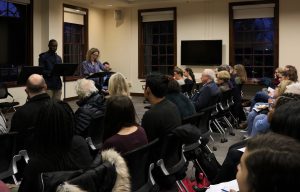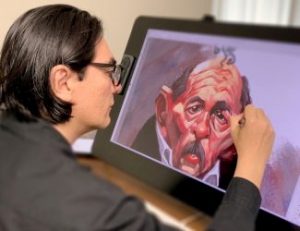 This year marks the second year of the UNC Center for Media Law and Policy’s James R. Cleary Student Paper Competition. Cash prizes are awarded to the student authors of published papers that most creatively and convincingly propose solutions to significant problems in the field of media law and policy, including First Amendment speech and press issues.
This year marks the second year of the UNC Center for Media Law and Policy’s James R. Cleary Student Paper Competition. Cash prizes are awarded to the student authors of published papers that most creatively and convincingly propose solutions to significant problems in the field of media law and policy, including First Amendment speech and press issues.
The competition was made possible by James Cleary’s daughter, Dr. Johanna Cleary, a Ph.D. graduate of the UNC Hussman School of Journalism Media and a former Park Fellow. Kriste Patrow, a UNC Ph.D. candidate in the School, asked Dr. Cleary about her Dad and his legacy.
Q: So, can you start by telling me a little bit about the work your father did?
Cleary: Well, my Dad was in a general practice most of his life, but he always had a great interest in and passion for the media. In fact, the way he paid his way through his undergraduate degree and a lot of his law school expenses was by working in radio.
Dad, as a teenager, began working as a radio announcer in the 1940s. He worked at some smaller stations in Alabama and then a featured spot on one of the major stations in Birmingham, Alabama. His radio show, at the time he was doing it, was actually the number-one rated program in the country. He was part of a group that put the first television station on the air in Huntsville, Alabama, which was very much a growing city at the time. And he also was part of a partnership that put together the second newspaper in Huntsville.
So, he had this great love for media and a great interest in it. He also understood the importance of law to our society, and so he ultimately went on to law school and was a practicing attorney for about 56 years.
Q: What kind of work did he do as an attorney?
Cleary: Well, because my Dad was in a general practice, his media specific work was geographically determined. Basically he was admitted to the group that could practice before the Federal Communications Commission. He did a lot of the legal work in terms of setting up the ownership for those stations, which is a pretty complicated process. So, from a very hands-on standpoint he was very committed to the importance of the media, and I think philosophically, the importance of the media to democracy. I think Dad really did believe in the Fourth Estate — that there is an important role in the press to play in preserving a democracy for us.
Q: So, he believed in the media’s role as a watchdog on government?
Cleary: The important thing that my father really believed in was an informed and educated population – the idea Aristotle had that informed people can make good decisions for themselves. That being informed just doesn’t happen by magic. There is a lot of work that goes into that: Work both on the part of the media and the part of the public, the consuming public.
Q: Can you tell me a bit about what inspired you to donate to the UNC Center for Media Law and Policy in particular?
Cleary: I am a product of the doctoral program there, and I was very fortunate to receive one of the Park Fellowships. So, I was very grateful to the School and to the Park family for having that opportunity. I could have gone to any number of different initiatives, but I knew the national reputation of the media law program there. I knew the individuals involved with the Center’s leadership there and certainly have the highest of opinions of them.
The Center was kind of getting up and running really at the time that my Dad visited UNC when I graduated. So, he had an idea of the quality of the program there. I think he highly approved of what was being done there and where they were going.
The importance of the press to our democracy just can’t be overstated and neither can the role that media law plays in making sure that stays the case. I mean, this isn’t just something that happens by luck and chance.
So, it was a collection of a lot of things. It just seemed to be the perfect match. I’m very pleased that they had the idea of creating this award in honor of my father. That’s very meaningful.
Q: What are your hopes for the Cleary Award moving forward?
Cleary: That’s a good question. I think people are looking toward the emerging scholars to say “Where do we go? What are the things we need to know? What are the rules that we need to come up with? Where do we leave it alone? Where do we need to roll up our sleeves and get involved?” This time, more so than any I remember, students have the opportunity to shape the future. My hope for the award is that it will recognize the impact that student scholars are already having and encourage the potential they have to shape, certainly the media field, but really our democracy to a large extent.





